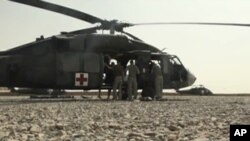President Barack Obama returns from vacation Monday to undertake an eventful week for U.S. policy in the Middle East. The president will mark the end of the formal U.S. combat role in Iraq, and the start of a new round of Middle East peace talks.
The U.S. combat mission in Iraq officially ends Tuesday.
President Obama recently told a U.S. war veterans group this meets a goal he set shortly after taking office. "And that is exactly what we are doing, as promised and on schedule," he said.
Watch Kent Klein's Report:
Fewer than 50,000 U.S. troops are still in Iraq, down from a high of 167,000 three years ago.
Those who stay will have a new mission, as of Wednesday: supporting and training Iraqi forces, working with Iraqis in counterterrorism missions, and protecting civilian and military efforts. All American forces are to exit Iraq by the end of 2011.
President Obama will outline the mission change in a speech to the American people Tuesday. He will preview the new U.S. mission in Iraq and discuss its relation to the war in Afghanistan.
Iraqis are especially interested in learning more about the new mission, according to Manal Omar, director of Iraq Programs at the United States Institute of Peace. "One of the most important things from President Obama's speech is to talk about what the new relationship will look like. That's the biggest question on Iraqis' minds: What will this new relationship be," he said.
While Iraq is far less violent than in the early years of the war, a recent increase in attacks has raised concerns about Iraqi security forces' ability to fight insurgents.
Manal Omar says it was Iraqi forces who engineered recent successful raids on insurgent leaders' homes. She says the problem is the Iraqi military is still hampered by the continued absence of a new government, almost six months after elections. "The home raids that go on, in terms of security procedures, have all been led by Iraqi security forces, so they have already demonstrated that they can do it, but it is almost impossible to do it if you do not have a government in place," he said.
As the mission change takes place Wednesday, several Middle Eastern leaders will be in Washington for the start of a new round of direct peace talks between Israel and the Palestinians.
After several months of negotiating through U.S. envoy George Mitchell, the Israelis and Palestinians have given themselves one year to resolve all "final status" issues. Mitchell expects a serious effort. "I believe that the two leaders themselves, President Abbas and Prime Minister Netanyahu, are sincere and serious and believe that it can be done, and we will do everything humanly possible to help them see that it is done," he said.
President Obama will meet separately Wednesday with Mr. Netanyahu and Mr. Abbas, and with Egyptian President Hosni Mubarak and King Abdullah of Jordan. He will also host the four leaders at a dinner Wednesday night.
On Thursday, the Israeli and Palestinian leaders will meet with U.S. Secretary of State Hillary Clinton at the State Department.
David Makovsky, from the Washington Institute for Near East Policy, is optimistic that progress can be made on borders and West Bank security. "Each side basically knows what the other side wants, and the differences are narrower, I think, than people think on those big issues," he said.
Makovsky, however, does not believe either side has prepared its public for compromise on refugee issues or the status of Jerusalem.
Mr. Abbas recently warned that his faction would withdraw from talks if Israel does not extend a freeze on its construction of Jewish settlements in the West Bank. The moratorium expires September 26. Mr. Netanyahu, whose governing coalition is divided on the issue, has not announced a decision.
Still, both sides are proceeding with plans to attend the talks here in Washington. And David Makovsky says that is a positive development. "You cannot make peace if the two parties are not sitting together. We now have this for the first time in the Obama administration," he said.
The meetings will be the first direct talks between Israel and the Palestinians in 20 months.




